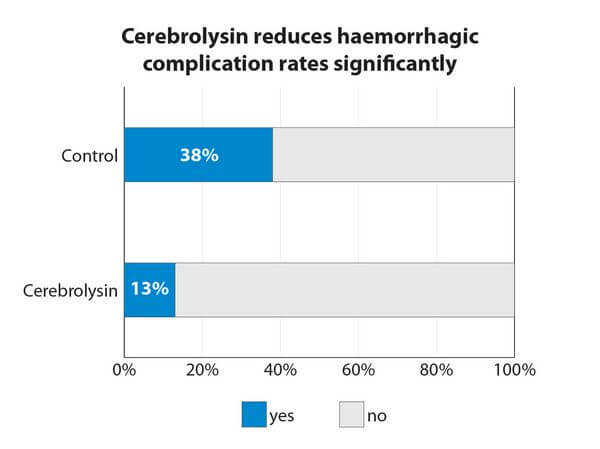Reducing Complications related to Thromolysis and Thrombectomy
Introduction
Recanalization therapy is the golden standard of acute ischemic stroke treatment, however, only 40 % present with a good outcome after 90 days, even if thrombolysis or thrombectomy have been successfully performed?
This proves that opening large occluded vessels alone is not enough to guarantee a good result for these patients, however, these opened vessels might improve the chances of neuroprotective agents like Cerebrolysin® to become more effective in the early stage after stroke, preserving brain tissue of the penumbra.
Another potential benefit of Cerebrolysin® is what Michael Chopp has recently shown in his research on human cells that the agent can improve the integrity of the blood brain barrier, therefore reducing hemorrhagic transformation, a major safety concern especially for patients at the end of the thrombolysis time-window or with so called “wake-up-stroke” patients.
Promising clinical results
In a recently published trial conducted at Zagreb University Hospital under the leadership of Prof Zdravka Poljakovic, 44 severe stroke patients with a baseline NIHSS > 8, undergoing recanalization therapies but clinically not improving, were either given Cerebrolysin® (n=23) as add-on therapy or only received standard therapy (n=21).
In this pilot study, a descriptive superiority of Cerebrolyin in mRS was demonstrated as well as a statistically significant reduction of hemorrhagic transformation, the mortality rate was also strongly in favor of the Cerebrolysin® group.
The rationale for improved clinical outcome
The multimodal neurotrophic agent Cerebrolysin® shows promise to have a positive effect on the late consequences of a reperfusion syndrome by reducing neuroinflammation, promoting neuronal cell viability and neurogenesis as well as stabilizing the blood-brain barrier.
Cerebrolysin® as add-on therapy seems to be beneficial and safe for patients with acute stroke in terms of lowering risk for hemorrhagic complications after recanalization therapy, a hypothesis which needs to be confirmed by larger randomized controlled trials.
